Softwares

FlooD MATTERS Decision Support System
INPI registration: BR512023001941-0
Authors: Adiel Teixeira de Almeida; Marcelo Hazin Alencar; Lucas Borges Leal da Silva
Summary: Urban adaptation implies combating the multifaceted effects of the climate and requires public managers to propose a broad agenda between public and private technical-scientific institutions, in order to take preventive, efficient, and innovative decisions concerning floods. Given this back-drop, presents a novel Decision Support System (DSS) for enhancing flood risk prioritization in urban areas under the multicriteria approach. Therefore, this DSS explores multidimensional models to support the decision-making process, thereby inserting the decision-maker's (DM’s) preferences, in terms of expected utility (EU), by using the Multi-Attribute Utility Theory (MAUT), Decision Analysis and other important methodological advances in this field. Comprising environmental, financial, human, mobility, and social issues simultaneously, the models deal with risk assessment bycombining the sources of hazard and its consequences with EUs under a stationary perspective, in short- and long- term decisions.
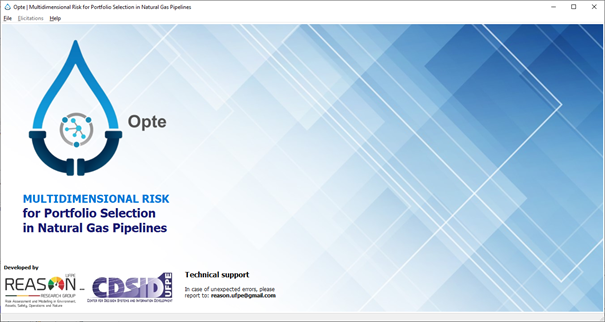
Opte: Multidimensional Risk for Portfolio Selection in Natural Gas Pipelines
INPI registration: BR512023001858-9
Authors: Adiel Teixeira de Almeida; Marcelo Hazin Alencar; Ramon Swell Gomes Rodrigues Casado; Cristina Pereira Medeiros
Summary: This Decision Support System (DSS) contributes to the decision-making process regarding risk management for natural gas pipelines, making it more explicit, rational, and structured. In other words, it is appropriate to consider an evaluation involving multiple dimensions of consequence to which pipelines are subjected. To this end, this DSS explores a multidimensional risk assessment (based on Utility Theory and Decision Theory) capable of aggregating the probabilities, consequence values, and preferences of the gas carrier manager in the face of this multiple-dimension scenario. In addition, it efficiently directs the focus of risk mitigation. A portfolio approach is used to support the strategic selection of the most critical sections of the pipeline. In this regard, the system introduces an implicit enumeration algorithm to handle portfolio selection when the interval scale is the sole form of measurement.
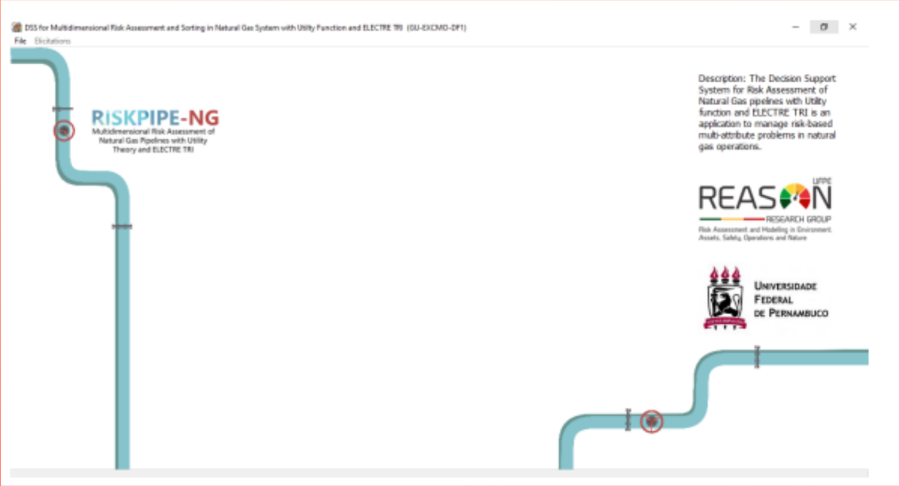
RISKPIPE-NG
INPI registration: BR 512021000748-4
Authors: Adiel Teixeira de Almeida; Marcelo Hazin Alencar; Rodrigo José Pires Ferreira; Francisco Filipe Cunha Lima Viana
Summary: The Decision Support System for Natural Gas Pipeline Risk Assessment, incorporating Utility Function and ELECTRE TRI, is an application designed to address multi-attribute challenges in the context of natural gas pipeline operations. The system computes multidimensional risks for different pipeline areas and classifies them based on risk levels, providing valuable insights for effective risk planning and control processes.
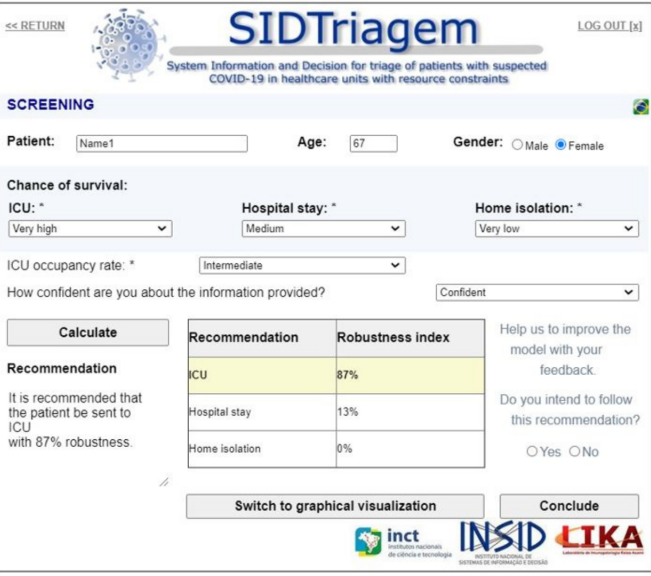
SIDTriagem
INPI registration: BR 512020002172-7
Authors: Adiel Teixeira de Almeida; Eduarda Asfora Frej; Rodrigo José Pires Ferreira; Alexandre Ramalho Alberti; Lucia Reis Peixoto Roselli; Moacir Fernando Morais Galdino de Lima; Murilo Carlos Amorim de Britto; Evônio de Barros Campelo Júnior
Summary: SIDTriagem is a decision information system for screening patients with suspected and/or diagnosed COVID-19 in units with resource restrictions. The product's contribution is that it offers a web-based application to support healthcare professionals' decisions in the context of the COVID-19 pandemic, in a resource-constrained context. Three important decisions are dealt with in SIDTriagem: screening patients; allocating patients to ICU (Intensive Care Unit) beds; and deciding on patient testing. Decision support for these three approaches is based on the utilitarian principle, aiming to maximize the number of lives saved. Factors such as the patient's clinical condition, laboratory test results and the patient's chances of survival in different scenarios are taken into account to provide a recommendation to healthcare professionals on the best course of action. The recommendation is given based on a robustness index for each decision alternative, which is calculated using a Monte-Carlo simulation process.
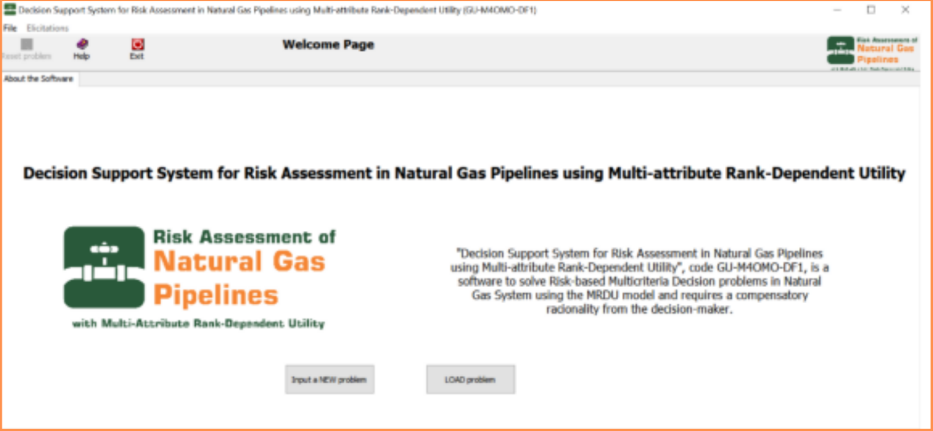
Decision Support System for Multidimensional Risk Assessment in Natural Gas Pipelines using Multi-attribute Rank-Dependent Utility.
INPI registration: BR 512020002173-5
Authors: Adiel Teixeira de Almeida; Cristina Pereira Medeiros; Marcelo Hazin Alencar; Lucas Borges Leal da Silva
Summary: The initiative involves implementing a multi-attribute risk assessment model for natural gas pipelines, integrating unexpected utility to enhance the precision of risk area recommendations for these pipelines. The environmental, human, and financial risks associated with the transportation and distribution of natural gas through pipelines offer the system a comprehensive understanding of potential damages resulting from operational failures, thus minimizing losses.
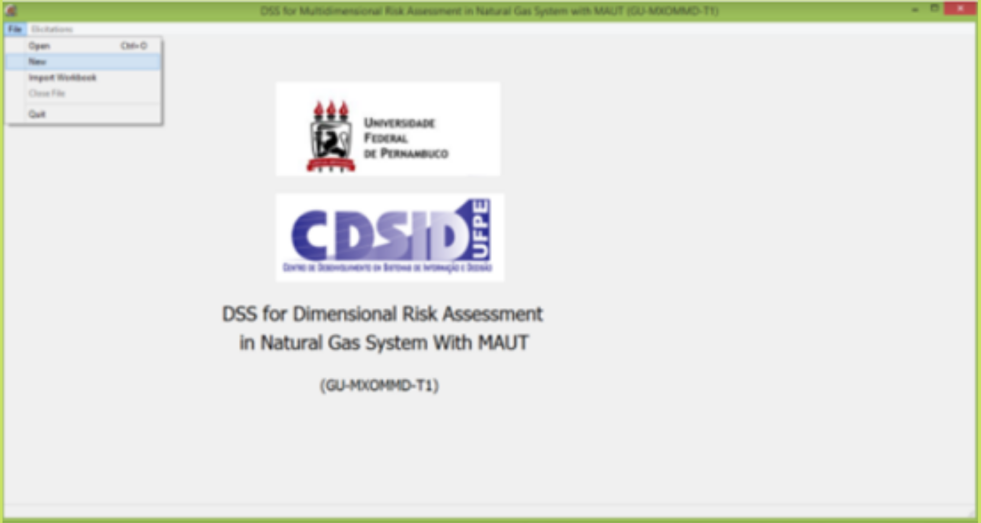
Decision Support System for Multidimensional Risk Assessment in Natural Gas System With MAUT
INPI registration: BR 512018001408-9
Authors: Adiel Teixeira de Almeida; Cristina Pereira Medeiros; Marcelo Hazin Alencar
Summary: The objective is to implement a multi-attribute risk assessment model for natural gas pipelines by integrating the multi-attribute utility theory (MAUT). This approach aims to enhance the credibility of risk area recommendations for the pipelines. The analysis of environmental, human, and financial risks in the realm of natural gas transport and distribution not only generates knowledge and expertise among decision-makers but also effectively reduces resistance, enhances knowledge within the business team, and streamlines the process of risk assessment and accident prevention in this intricate context.
Processes
Risk management for fire protection project implementation
Authors: Thiago Jonatan Silva Xavier; Marcelo Hazin Alencar
Purpose – To support risk management for the implementation of fire protection projects, enabling standardization of internal processes for service procurement and the formulation of an operational action plan.
Risk assessment process in the regulatory environment:
Authors: David Jose Oliveira da Silva; Marcelo Hazin Alencar
Purpose – To support risk assessment in the regulatory environment, specifically focusing on the regulatory activities of the agency, with an emphasis on risk management for intermunicipal passenger transportation within the originating state.
Process for spare parts sizing based on NSGA-II applied to vehicle maintenance in military operations
Authors: Jose Joaquim da Silva Neto; Rodrigo Jose Pires Ferreira
Purpose – To maintain efficient operations with a high availability rate, maintenance costs significantly impact fleet management. These costs tend to increase as the lifespan of vehicles increases. The proposed process is based on a spare parts sizing policy and the multi-objective genetic algorithm NSGA-II. This approach is applied to corrective maintenance of vehicles in a military operations context. Given a limited budget scenario, decision support for acquisitions aims to create a portfolio of items with lower costs and higher service levels. The goal is to ensure that inventory levels do not exceed future failure demands.
Process for decision support in investigating counterfeit currency crimes based on the FITRADEOFF method
Authors: Acir de Oliveira Junior; Rodrigo Jose Pires Ferreira
Purpose – Counterfeiting of the national currency is a problem that significantly affects the essential functions of currency, particularly its credibility and trust as a medium of exchange and store of value. Additionally, this criminal practice has significant impacts on the economy and the population, especially among the most disadvantaged segments. Due to operational and financial constraints faced by public security institutions, it is essential to explore alternatives that maximize efforts in combating this illegal activity. Utilizing available resources, the proposed process relies on a multi-criteria decision support model. Its goal is to prioritize cases of greater relevance as an investigative framework, concentrating efforts on enhancing results by reducing counterfeit notes in circulation through the dismantling of key production laboratories.
Descriptive analysis process for graduates in production engineering courses
Authors: Leonardo Arcanjo de Albuquerque; Rodrigo Jose Pires Ferreira
Purpose – To monitor alumni based on three pillars: Professional Career, Education, and International Experience.
Productivity evaluation process for operators in a steel industry with diverse SKUs
Authors: Ismael Rodrigues de Oliveira Júnior; Rodrigo Jose Pires Ferreira
Purpose – A process for evaluating productivity in the rebar cutting and bending industry.
Spare marine hose sizing process for offshore water terminals
Authors: Heitor Fagner Lopes de Lima; Rodrigo Jose Pires Ferreira
Purpose – Determination of the optimal quantity that should be maintained in the stock of hose couplings.
Waste reduction process for an automotive components factory
Authors: Bernardo Jose de Oliveira; Rodrigo Jose Pires Ferreira
Purpose – A process for minimizing waste in the production process for an automotive components factory.
Decision support process in innovation and product development projects in industry
Authors: Mariana Campos Marinho de Macedo; Rodrigo Jose Pires Ferreira
Purpose – A process to support decision-making in the selection of the optimal portfolio for developing new products, using new product development methods and multicriteria decision support.
Decision support process for defining the location of a new recycled paper mill
Authors: Bruno Victor Fernandes Santos; Rodrigo Jose Pires Ferreira
Purpose – A process to support decision-making in the selection of the optimal location for a new recycled paper factory, using a model built based on location theories and logistical principles
Process for defining the periodicity of predictive inspection of rotating equipment with multiple failure modes based on delay time
Authors: Everson Luiz da Silva Maia; Rodrigo Jose Pires Ferreira
Purpose – A process based on a mathematical model for determining the monitoring frequency of rotating equipment with multiple failure modes, using the Delay Time technique.
